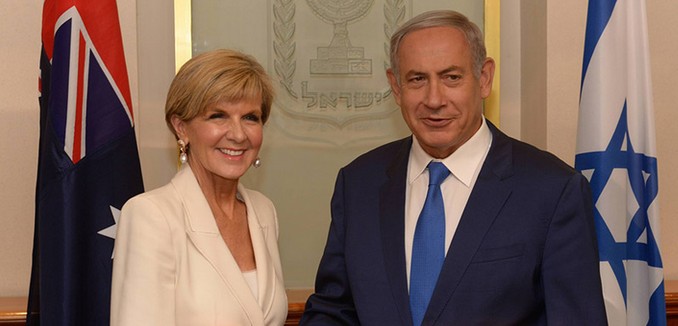On a state visit to Israel on Sunday, Australian Foreign Minister Julie Bishop invited Israeli Prime Minister Benjamin Netanyahu to visit Australia early next year, which would make him the first sitting Israeli Prime Minister to visit Down Under.
“Your friendship is terrific – Australia, the government’s and yours personally. And we appreciate our friends,” Netanyahu told Bishop.
“I want to take this opportunity to reaffirm our absolute enduring commitment to the State of Israel and our friendship, and invite you to come to Australia,” Bishop said in her response. “And we’re thinking there’s a little window of opportunity early next year maybe? And the Australian public would warmly embrace you, welcome you and we would look forward to the first visit of an Israeli prime minister ever to Australia.”
Netanyahu has reportedly accepted the invitation.
Bishop also met with Israeli President Reuven Rivlin and Defense Minister Avigdor Liberman. In welcoming Bishop, Rivlin highlighted the friendship between their two countries, and noted that Israel and Australia were cooperating “greatly on issues that are of concern to the whole free world,” including cybersecurity. He also paid tribute to Australian service members “who helped the Jewish people return to their homeland, along with the necessity to cooperate with all of the people living here.”
Rivlin expressed Israel’s interest in restarting peace negotiations with the Palestinians, but regretted that “the Palestinians are looking for other arenas to debate with us in the international arena.” Bishop noted that Australia had supported Israel in international fora, where there were “obviously biased, discriminatory and unfair resolutions put forward” against Israel.
Bishop was behind the Australian government’s decision two years ago to stop using the term “occupied” to describe parts of Jerusalem that came under Israeli control in 1967. This was followed by Australia’s decision not to refer to any territory captured by Israel in 1967 as “occupied.” “I don’t think it’s helpful to prejudge the settlement issue if you’re trying to get a negotiated solution,” Bishop told the Times of Israel at the time. “And by deeming the activity as a war crime, it’s unlikely to engender a negotiated solution.” Instead, the issue of the territories should be “determined in the course of … peace talks.”
[Photo: Amos Ben Gershom / GPO ]




